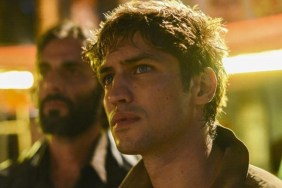Cast:
Abbie Cornish as Wally Winthrop
Andrea Riseborough as Wallis Simpson
James D’Arcy as Edward
Oscar Isaac as Evgeni
Richard Coyle as William Winthrop
David Harbour as Ernest
James Fox as King George V
Judy Parfitt as Queen Mary
Haluk Bilginer as Al Fayed
Geoffrey Palmer as Stanley Baldwin
Natalie Dormer as Elizabeth
Laurence Fox as Bertie
Douglas Reith as Lord Brownlow
Katie McGrath as Lady Thelma
Christina Chong as Tenten
Nick Smithers as Major Fruity Metcalfe
Damien Thomas as George
Liberty Ross as Connie Thaw
Ryan Hayward as Win Spencer
Charlotte Comer as Lady Alexandra
Duane Henry as Dwayne / Security Guard
Directed by Madonna
Story:
For most of her life, New Yorker Wally Winthrop (Abbie Cornish) has been obsessed with the relationship between Wallis Simpson (Andrea Riseborough) and King Edward VIII, who had to abdicate his throne for the love of the American divorcee. As she oversees a Sotheby auction of some of their belongings, Wally’s tumultuous marriage gets increasingly more abusive, so she decides to lose herself in their romantic story.
Analysis:
Madonna’s second movie as a director is far more ambitious than the earlier “Filth and Wisdom,” but it’s also a stronger film that sadly suffers from the weight of its own ambitions.
If you saw Tom Hooper’s “The King’s Speech” you’re likely to remember Wallis Simpson as the woman who essentially sabotaged the reign of Colin Firth’s older brother. When the story is told from Wallis’ perspective, as filtered through the writing of Madonna and Alek Keshishian, it’s a grand love story about a man who would give up being King of England to be with the woman he loves. Almost sixty years later, a New York woman’s lifelong obsession with Wallis and her relationship with Edward has reached a point where she’s losing herself in fantasies about them in order to escape her abusive marriage.
Andrea Riseborough gives a stunning performance as Wallis, the tough-minded American who nearly destroyed an empire, and in every scene, Riseborough’s presence as an actress keeps you riveted. She’s having an affair with Edward right in front of her husband Ernest, played by David Harbour, something which becomes apparent during a dinner scene where she scolds the prince for tearing her dress, beginning the duo’s issues with Edward’s family and fellow royals never support or approve of his choice in women. It’s obvious these flashback scenes would have made a perfectly fine period piece in itself, and whenever it moves back to the present day, the film moves at a glacial pace, maybe because Wally’s life just isn’t every interesting.
Her scenes mainly involve her mooning over items from the duo’s estate at a Sotheby auction, and for whatever reason, it’s harder to acclimate to this world than it is to the world of British royalty. Wally continues to fantasize about what Wallis and Edward’s life must have been like though she’s too scared to bid at the auction until she’s egged on by a Russian security guard, played by Oscar Isaac. When she maxes out her husband’s credit cards, it finally sends him over the edge.
Compared to Riseborough, Abbie Cornish’s performance is rather flat, which is a shame since she showed so much promise when younger, but the only time we see any emotion from her, she’s prone to histrionics. Isaac’s absolutely awful Russian accent quelches any chance of taking his performance seriously either. For the most part, the men always take a back seat to the women, which probably makes sense for what Madonna was trying to achieve, but the modern-day love story ultimately falters compared to the romance between David/Edward and Wallis.
It’s almost impossible to watch “W.E.” without having something in the back of your mind subconsciously reminding you this is directed by the Madonna behind “Ray of Light,” “Papa Don’t Preach,” etc. Sadly, this will mean so many critics will write it off for this reason alone, even though it’s fairly evident how well she’s improved as a director since her previous film. For better or worse, she still caters to the whims of her artistic sensibilities, which leads to scenes like Wallis dancing drunkenly at a party to the Sex Pistols’ “Pretty Vacant,” a song that won’t be written for forty years. To some, this decision may seem somewhat offputting, but in fact, it’s the one moment in the film that shows true inspiration and it’s a shame she didn’t try to shake things up more rather than resorting to a rather staid telling of the two concurrent stories.
When the flashbacks reach the point when the story overlaps with “The King’s Speech,” that’s when it becomes painfully obvious this just isn’t as good a film either in terms of writing or acting and yet, the historic film continues to be strong while the present day one gets worse and worse leading into the third act.
The Bottom Line:
“W.E.” suffers from some of the same issues as “Julie & Julia” in that the historic storyline is far more interesting and better done than the present day one, which ultimately leads to half a decent movie and another half that’s almost unbearable.










